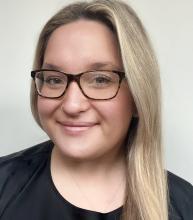On offense: Proactively personalizing medicine to optimize health
Laura Lile, MD, RPh, BS Pharm ’87, a dual-credentialed physician and clinical pharmacist, is nationally sought after for her proactive approach to preventative health and wellness – primarily using genomics.
“I started down this path for my own family because we have extremely high cardiovascular and stroke risk,” Dr. Lile said. “I wanted to see my mom and dad be able to live a longer life, rather than losing them at 70 years old, which was common in my family history.”
Dr. Lile’s career has always been in the details.
After her mom had a heart attack at a young age, Dr. Lile began looking into epigenetics to understand what she could do to improve her mom’s health. However, she wanted to go further – asking ‘what is the root cause of the disease or condition that patients are experiencing?’

My whole premise has been personalized medicine. I’ve never had a cookie-cutter approach. The pharmacist in me realizes that every person is different; how the body metabolizes something varies from patient to patient.
Now, through her practice, Lile Wellness Partners, Dr. Lile partners with patients to provide precise and comprehensive insights into their genetic makeup through IntellxxDNA™ testing. In addition, she uses bloodwork as the primary basis for following trend analysis of patients – both healthy and unhealthy. The Lile Wellness team can then tinker with medicine and supplement regimens to attain optimal health for their patients’ individual needs.
“We practice offense medicine, not defense,” Dr. Lile said. “We believe in getting to the root cause of a disease state or condition. Rather than treating the condition only, we look at what may be causing it, such as lifestyle or genetic predispositions, to optimize a patient’s health.”
Genomic testing allows patients to understand their genome and then dial in to very specific single nucleotide polymorphisms (SNPs) to see their risk factors for certain conditions and disease states. Pharmacists and physicians can then use that information to understand how to work around those SNPs. Using the gene variants, the health care team can modify risk using targeted medicine and supplements and then monitor the patient’s response through bloodwork.
“We use these reports to analyze genes that are present in very low percentages in the population, less than 5% to 10%. We question why these genes still exist in someone's gene pool while the rest of the world has evolved and gotten rid of them” Dr. Lile said. “We then take a deep dive into the research to see what those genes have a higher risk of causing. In isolation, these gene variants are helpful to know, but without the IntellxxDNA™ tool and the evidence-based recommendations that it provides, it can be scary to know you carry a high-risk gene. These clinical decision tools remove that fear because now we can decipher how to override that part of your genome.”
Dr. Lile says that PharmDs are the perfect health care practitioners to perform the complex work of interpreting a genomic test, due to their expertise in the usage of medicine and accessibility to patients.
“To use this tool effectively, you don’t need to prescribe medicine. You are guiding patients with a clinical tool to understand their genome and the why behind disease states like diabetes or depression. You can provide them with a powerful tool that can be refreshed on a routine basis, putting the pharmacist in an excellent position to be the patient’s health care advocate. Genomic tools can expand the role of the pharmacist.”
Her strong belief that pharmacists can play a vital role in this process led Dr. Lile to invite four Ohio State PharmD students to an IntellxxDNA™ conference in the summer of 2023. She felt that it was her pharmacy training – not her medical training – that enabled her to understand the extremely complex reports she receives through genetic testing.
One of the students who attended the conference, Class of 2024 PharmD candidate, Kate Pollock, has continued her work with Dr. Lile and will join the Lile Wellness team upon her graduation in May 2024 as the first full-time PharmD in the clinical practice who will see patients and complete consults, rather than filling prescriptions.

I strongly agree with Dr. Lile that PharmDs are primed to implement this precision-based, evidence-backed genomics consulting because it allows pharmacists to utilize the full scope of our education and practice at the top of our license. With the education that we have on how drugs work, we can apply that to supplements and genomics – it gives us the golden ticket to find what works for each patient. With IntellxxDNA™ data about a patient, we can figure out how to override their genome, allowing the patient the opportunity to live their healthiest life.
Even before tools like IntellxxDNA™, Dr. Lile had been using patients’ bloodwork markers to narrow in on improving health outcomes. However, the IntellxxDNA™ report, provides an immediate roadmap to optimal health outcomes without having to guess what’s going on with only some of the information.
“I’ve spent years tweaking medications and supplements in patients to ensure that I see the responses in their blood work that I expect to see. While I’ve been doing this for years, I now have a clinical decision support tool that can get patients to optimal medication support on day one because we know exactly what their body needs.”
Dr. Lile and Pollock both attest to the benefits that their patients are seeing through this DNA-targeted precision-based medicine approach.
“It has been great to meet with patients at their follow-up visits and hear how they’ve been able to participate in things like hiking or exercise that they weren’t able to before the testing,” Pollock said. “Patients are seeing progress on their health goals faster because we are able to tailor their body’s unique needs to them.”
They both also say the key to this type of intervention being used more widely is for pharmacists to continue to advocate for the profession.
“The power of this tool can exponentially expand the role of pharmacists,” Dr. Lile said. “Pharmacists understand this complex medication and supplement-related data and use it to advocate for, and partner with, our patients. We need to identify the skill sets and value that we have as pharmacists to be a part of the solution. We’ve been doing it for years – pharmacists have always been the trusted healthcare professional, especially in rural communities that routinely experience a shortage of doctors. This is a natural progression for the profession of pharmacy.”